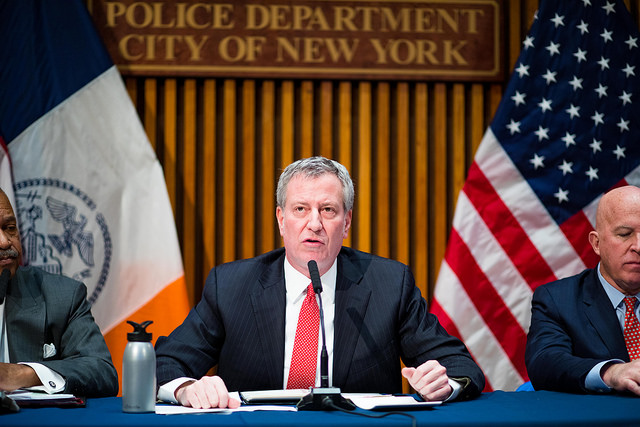Yesterday's L train shutdown town hall in Williamsburg was a relatively staid affair compared to last week's in the West Village. Most people testified about the need for good 24/7 bus service over the Williamsburg Bridge and safe biking infrastructure during the subway outage. No one expressed outright opposition to DOT's plans for transitways and bike lanes.
The bombshell came from MTA Chief of Operations and Planning Peter Cafiero, who said that the J/M/Z will max out at 24 trains per hour in the peak direction over the Williamsburg Bridge. That's only three trains per hour more than current peak service, and, as Aaron Gordon reported in the Village Voice, it highlights a serious gap between the number of displaced L train riders and the subway system's capacity to absorb them.
If it wasn't already clear that surface streets will have to do serious heavy lifting during the L shutdown, there's no longer any doubt.
And yet, the person who can exercise the most control over the streets, Mayor de Blasio, remains stuck in a state of feckless apathy regarding the impending cataclysm.
The problem isn't that the city lacks a plan. NYC DOT has mapped out transitways on Grand Street, Delancey Street, and 14th Street, as well as good bikeways on similar routes. The Williamsburg Bridge will be reserved for vehicles with three or more occupants, and one lane in each direction will be exclusively for buses and trucks (some of the time).
The problem is that the plan doesn't match the scale of the disruption. And that's where leadership from de Blasio is sorely lacking.
Instead of placing HOV restrictions on all four East River crossings, the city is only planning for them on the Williamsburg Bridge. Instead of bus lanes and HOV rules in effect 24/7, the city says they will only be in place during "peak hours" which have yet to be defined. Instead of a car-free busway on 14th Street extending east to Avenue A, which advocates say will be necessary to maintain fast, reliable service, the city's busway plan doesn't go past Third Avenue.
De Blasio appears to view this all with a sense of clueless detachment, not as a calamity for hundreds of thousands of people that he has to avert.
Earlier this month, de Blasio said his goal on 14th Street is to "minimize the disruption... to the maximum extent possible." In that context, "minimizing disruption" means appeasing the West Village residents who are selfishly trying to stop DOT's transit and bike improvements on and around 14th Street. He characterized the call for a 24/7 busway as transit advocates "fighting for their position."
"We think there’s obviously a difference between rush hour and the other times a day," the mayor told reporters.
That's been the pattern all along for de Blasio, who's spent the two-and-half years since news of the shutdown leaked twiddling his thumbs.
Back in 2016, the mayor's initial response was to criticize the MTA and speculate that the shutdown was not actually necessary. He argued that running buses effectively was the sole responsibility of the MTA, and he promoted citywide ferry service as a solution, even though it can carry only a small sliver of L train riders.
De Blasio's political instinct is to dodge all accountability for transit problems. And on most subway matters, he's right -- it's Governor Cuomo's MTA.
But the L train shutdown will create transportation problems that won't be confined to the subways, and it's the mayor who decides how to apportion space on NYC's streets. De Blasio can't dodge this transit problem. If the city isn't prepared to keep people moving without the L train, New Yorkers will be right to blame him for it.






